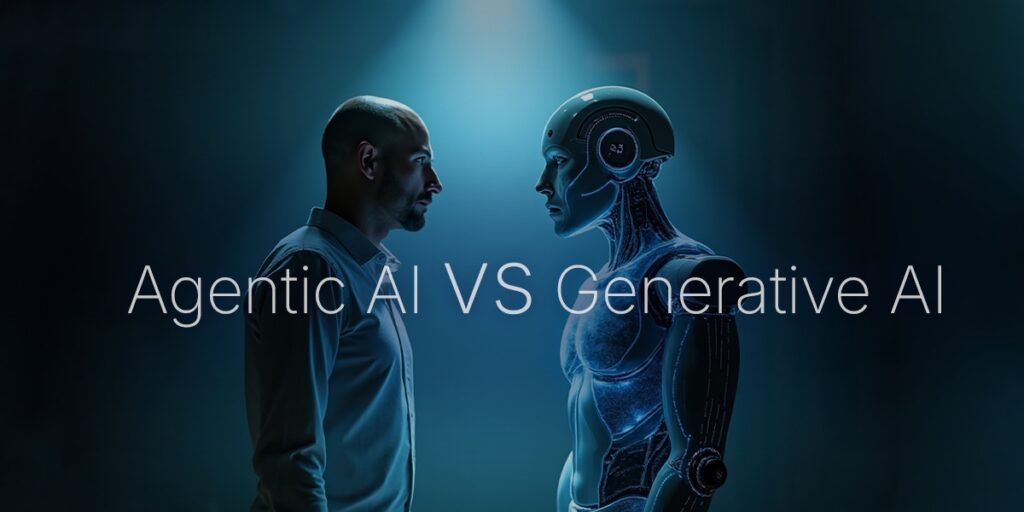
“AI will be the most transformative technology since electricity.”, these words by Google’s former CEO, Eric Schmidt, pertinently capture the impact of artificial intelligence on our world. AI is a general-purpose technology like electricity that is already impacting our economies and altering our social structures.
When it comes to AI and machine learning solutions, we are mostly familiar with generative AI (GenAI) due to ChatGPT. However, agentic AI is another powerful AI that is leading the AI revolution.
Agentic AI vs generative AI are two distinct subfields of artificial intelligence. One excels at generating content, while the other takes action. But most people don’t really know the differences between the two.
In this article, we’ll explain what GenAI and agentic AI are, their major differences, and each’s use cases to help you better understand these terminologies and brush up on your AI literacy.
What is GenAI?
Generative AI is an AI system that is designed to create content. These are deep-learning models that can generate high-quality text, images, and other content based on their training data.
The launch of ChatGPT in late 2022 put GenAI in the limelight, and so far, it is the most widespread AI technology in public use. Generative AI shows the creative side of AI, as GenAI applications can generate content that mimics human creativity.
Here are the core features of generative AI:
1. Content generation
When it comes to agentic AI vs generative AI in content generation, GenAI is hands down the winner. It can create text, images, and other media that feel very real, as if it is created by humans.
2. Pattern recognition
GenAI tools learn from massive amounts of data to understand language, visuals, and other structured data. This enables them to predict the next element in a sequence.
3. Prompt-based
ChatGPT, DeepSeek, or Claude, these are all GenAI models, and they respond to your prompts. They are inherently reactive and generate output based on your input.
4. Multimodal capabilities
GenAI models can operate across multiple media formats and can convert inputs from one format to another.
5. LLMs
Large language models (LLMs) are the building blocks of GenAI. Whether it’s enterprise AI solutions or a small project, any GenAI tool’s capabilities are only as good as the training of its LLM.
What is Agentic AI?
Agentic AI systems autonomously make decisions and act with little or no human supervision to accomplish their tasks. These autonomous AI systems take the agentic AI vs generative AI conversation a step further; they don’t wait for prompts; rather, they figure out how to do things.
These systems consist of AI agents, which are machine learning solutions that imitate human-like decision-making processes. An AI development company that makes agentic AI can create an AI assistant for you that can propose an itinerary, email contacts, and book reservations all on its own.
These are the key features of agentic AI:
1. Autonomy
Autonomy level is different in agentic AI vs generative AI. Agentic AI operates independently, initiating actions based on goals rather than prompts.
2. Tool integration
They use APIs, software plugins, and external systems to take real-world action. For example, agentic AI uses external tools to perform AI software development tasks.
3. Goal-based
These systems must be given a high-level objective, which they plan multiple steps to achieve.
4. Adaptive feedback
Agentic AI programs learn from the success or failure of tasks and can adjust their strategy over time.
5. Collaboration
Different agentic AIs can coordinate with each other to divide and complete complex tasks through collaboration.
Agentic AI vs generative AI: Major differences
Agentic AI and GenAI represent significant strides in artificial intelligence development. Both are distinct but complementary branches of AI that are setting the foundations of the future world.
These are the top key differences between the two that you should know to distinguish between them.
Primary function
The agentic AI vs generative AI comparison can be best explained by their primary function. The former is designed to act and do, while the latter is designed to create.
Agentic AI focuses on autonomous decision-making and task execution with specific goals. On the other hand, generative AI is designed to create new content, whether it be text, images, videos, or any other media.
Autonomy and proactivity
Agentic AI vs generative AI has a clear differentiator in their level of autonomy. Agentic AI is built to be autonomous and proactive. It can operate with limited human supervision, use reasoning, and determine the best course of action.
In contrast, GenAI is inherently reactive. It is entirely dependent on the user’s prompts to generate content that is relevant. This requires that chatbots like ChatGPT, Gemini, and DeepSeek must be given direct and specific prompts to give desired results.
Dynamic vs static
Another key difference between agentic AI vs generative AI is their interaction with the environment. Agentic AI is dynamic and interactive; it constantly processes new information and learns from its environment. For example, AI agents applied to computer vision solutions can learn from experience and autonomously analyze visual data.
Generative AI is mostly static and strictly operates within its training data and predefined parameters. Such AI models don’t directly interact with the external world.
Level of complexity
Agentic AI is designed to deal with more complex goals than generative AI. It can work around complex, multi-step goals that require logical reasoning and continuous learning. For example, business process automation services use AI agents to automate complex business operations.
In comparison, GenAI tasks are usually narrow in scope and well-defined. Generative AI development services design their models to handle specific tasks, such as generating a piece of text or creating an image.
Foundational architecture
Agentic AI vs generative AI differences get a bit blurry at the architectural level. Agentic AI is actually built on generative AI foundations, but it further incorporates autonomous decision-making capabilities. This is due to its perceive-reason-act-learn cycle.
On the opposite side, an AI architect optimizes the architecture of GenAI models for high-quality content generation, which requires fewer complex integrations with other systems.
Use of external tools
Agentic AI vs generative AI differ in tool integration. As mentioned earlier, agentic AI can use external tools and software to execute tasks, such as triggering API calls or conducting market research autonomously for purposes like AI product development. Contrarily, GenAI typically operates as a self-contained system for content creation.
Learning and adaptation
Agentic AI continuously learns and improves through a feedback loop, adapting its behavior based on the outcomes of its actions. While Generative AI can be fine-tuned, its primary learning is based on its initial training data, and it doesn’t learn from its own generated outputs in the same way an agent does.
Agentic AI vs generative AI: Use cases
Agentic AI and generative AI are designed to augment human judgment and expertise. There are multiple use cases for both in several fields, from AI development services to business analytics.
Agentic AI use cases
Agentic AI excels in scenarios requiring autonomous decision-making, problem-solving, and interaction with dynamic environments.
- Software development: Developers are using AI agents to automate tedious and repetitive coding tasks. This boosts their productivity and frees up their time to focus on more important challenges.
- Healthcare: Agentic AI can create modern HealthTech products that can assist doctors in analyzing vast amounts of medical data to make informed decisions. AI agents can also provide 24/7 patient support and automate the regular administrative tasks of hospitals and medical care facilities.
- Financial analysis: The financial world needs continuous monitoring and data-driven predictive analytics to analyze market trends and execute trades in real-time. Agentic AI is capable of doing that within predefined limits, which reduces financial risks.
- Research and investigation: Agentic AI systems can be of great assistance in scientific research and discovery. They can design experiments and then analyze their results to drive a logical hypothesis. Moreover, using their feedback loop, they can learn from previous cases to create new and better experiments.
- Customer service: Most chatbots usually employ GenAI, but they don’t go beyond simple question-answering. Agentic AI chatbots can handle the entire customer service experience and even complete transactions to make the user experience more streamlined and cost-effective for companies.
Generative AI use cases
Generative AI is primarily good for creating new content and ideas in creative and data-driven fields.
- Content creation: GenAI tools can be used to create content for marketing, social media, and information channels. Further, these tools can be trained to generate content in any particular way you want, whether it’s a specific writing style or art technique. This makes GenAI your personal creative work assistant.
- Code generation: Companies are already using AI agents to assist developers in code generation. There is a lot of repetitive programming in software development, and GenAI can automate those tasks, even creating entire applications.
- Translation devices: Real-time translation has become significantly faster and more accurate with GenAI. Machine learning consulting companies are using generative AI features to develop translation devices and services that can better understand context and nuance.
- Product design: AI product development can expedite the traditional product design and prototyping process. Product managers can rapidly generate design variations and prototypes for anything, including architecture, fashion, and technology.
- Virtual assistants: Generative AI will only make virtual assistants like Alexa and Siri smarter and more capable. It will help improve conversational AI to understand the intent of the user in a better way and respond with accurate, human-like responses that feel close to life.
Agentic AI vs generative AI: Exploring the future
You now have a better understanding of the agentic AI vs generative AI discourse. But which out of these are business and tech leaders betting on to define the future of AI? Generative AI is more popular and widely adopted, while agentic AI is quietly growing and projected to be a major part of enterprise software.
Looking at it objectively, the future of GenAI and agentic AI will intersect even more as AI continues to evolve. They aren’t mutually exclusive and will work together to change various aspects of technology, business, and daily life.
They already overlap in some aspects, and the lines between agentic AI vs generative AI will only get blurrier, which will possibly lead to a new AI system that converges the capabilities of both. For example, an AI robot that not only generates innovative ideas but also implements them on its own.
Therefore, understanding agentic AI vs generative AI differences matters to you. According to Gartner, building AI literacy is a must-have skill for the future workforce.
Conclusion
Artificial intelligence is a domain with distinct yet complementary fields. GenAI and agentic AI are two of the most important AIs that will be part of your life in more ways than you might think.
Generative AI has enabled unprecedented levels of AI creativity and personalization, while agentic AI is driving the next wave of AI automation and intelligent systems.
It is important to have a better grasp of agentic AI vs generative AI differences to figure out the professional, ethical, and societal impacts of AI. The two are increasingly converging, but knowing their nuances will give you vital insight into how AI systems work.
Xavor is an AI development company that is situated right in the heart of Silicon Valley. Our artificial intelligence development services have experience working with the latest tools and technologies in GenAI and agentic AI.
Ready to start your AI journey? Drop us a line at [email protected] to talk to our experts.
